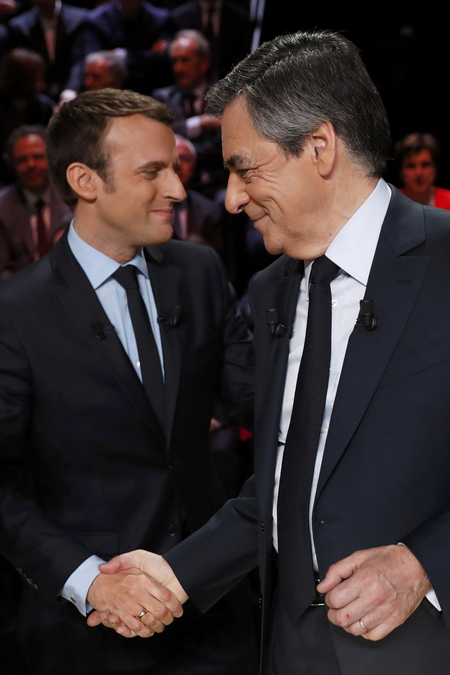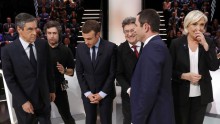The first TV debate of candidates for the office of head of state was held on the French TF1 channel, which marked the beginning of the presidential campaign. The media claim that 10 million viewers watched the debate of 5 out of 11 contenders for France’s topmost office.
As it was expected, a heated exchange of words broke out between Emmanuel Macron, an independent candidate, ex-minister of economy, founder of the En Marche movement, and Marine Le Pen, a far right populist, leader of the National Front. According to public opinion polls, they are running neck and neck today, supported by 26 percent of the voters. Accordingly, these candidatures are likely to win in the first round of the elections on April 23. The polls predict that Macron will outrun Le Pen in the runoff, to be held on May 7, gaining 65 percent of the votes against 35. Macron and Le Pen clashed several times at the TV debate, accusing each other, respectively, of “saying empty words” and “lying to the French people.”
Meanwhile, French ex-premier Francois Fillon positioned himself as a “wounded beast” at the debate, trying to muster support against the backdrop of an inquiry into the illegal payment of public funds to his family members. Observers note that he looked calm, as befits a statesman. Fillon confessed that he “might have been making mistakes” and has some defects as well as, at the same time, great experience. In the meantime, two other left-wing candidates, Jean-Luc Melenchon and Benoit Hamon, avoided reciprocal attacks and focused on the other candidates – Macron and Le Pen.
Macron, 39, was the youngest candidate on the stage. He was trying to prove that he can stand his ground. Observers believe that he managed to pass the presidential test, sticking to his own “pragmatic platform” and preventing the more experienced Fillon from outplaying him. Macron was also rejecting the claims of the two abovementioned rivals who accused him of defending corporate interests. Yet, as some observers point out, he failed to enrapture the audience. The En Marche leader’s insistence on a pragmatic platform shadowed his uniqueness in this campaign – especially his young optimism. Besides, his debating style looked somewhat awkward.

REUTERS photo
This was obviously clear when the candidates discussed the subject of immigration. In particular, defending the proposed annual entry quotas for foreigners, ex-premier Fillon said he categorically disagreed with Macron who had welcomed in Berlin the German chancellor’s immigration policy. Macron failed to adequately respond to this reproach.
What interested Ukrainians were, naturally, the foreign-policy issues discussed at this debate. In this aspect, Macron’s position is noteworthy, for he said that France could be a more independent state on the international arena if it cooperated more closely with its European partners instead of coming closer to Russia. “France and the US have an old common history. We used to keep global peace together, forging historic alliances. If elected, I will try to achieve a greater independence for our country, assuming more independence at the European level instead of coming closer to Mr. Putin,” the En Marche leader emphasized.
Meanwhile, the other main candidate Le Pen, whose party receives funds from Russian banks, is taking an overtly pro-Putin stand. By contrast with Macron, an outright Europhile, the National Front leader said the EU hinders France from moving anywhere. At the same time, as observers noted, Le Pen never voiced her position on an EU withdrawal referendum in the course of a three-hour debate. Maybe, after Euro-skeptic Geert Wilders had suffered a defeat in the recent Dutch elections, she understood that it was better not to broach this subject.
Summing up the three-hour debate, the BBC notes that Macron intends to change the traditional left-right rift in that country, whereas Le Pen promised to put an end to any immigration and stressed that France must not be a “blurred region” in the EU or servile to German Chancellor Angela Merkel. Fillon, a friend of Putin’s, promised to become, if elected, the president of “national renaissance.”
According to the newspaper Le Figaro’s online polls, Macron and Fillon made the most positive impression on the French during the TV debate – out of the almost 45,000 polled, 37 and 25 percent preferred Fillon and Macron, respectively. They are followed by the left-wing politician Jean-Luc Melenchon and the National Front leader Marine Le Pen, with 16 percent each. The Socialist candidate Benoit Hamon closes the list with 5 percent.
Radio France Internationale (RFI) has a somewhat different opinion. It says there was nothing unexpected at the first TV debate, and Emmanuel Macron, who is not used to this kind of competitions, showed an ability to resist the attacks of his rivals. The RFI website notes that each of the candidates remained faithful to their position and style and it was difficult to identify the winner in these conditions, but polls show that Macron is considered to have been the most convincing.








